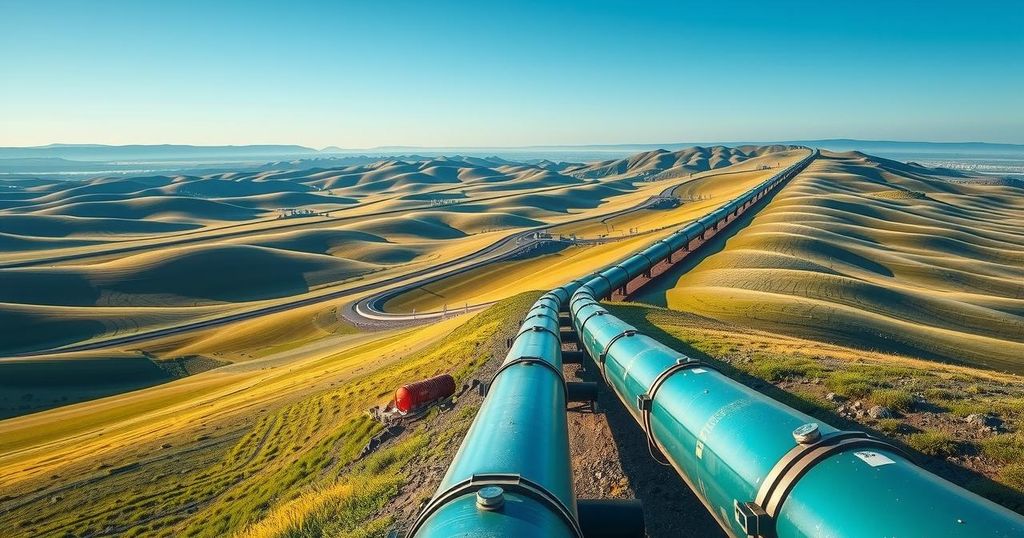The Trump administration is mediating a peace agreement between Russia and Ukraine, which poses risks to Kazakhstan due to damages to the Caspian Pipeline Consortium (CPC) from a recent drone attack. The ongoing conflict could significantly impact Kazakhstan’s oil revenues, which are crucial for its economy. Despite these challenges, Kazakhstan’s oil production has reached record levels, spurring discussions about future export strategies amid compliance concerns with OPEC+ quotas. Analysts predict that demand may surpass supply in upcoming quarters, offering a cautiously optimistic market outlook.
Recently, the Trump administration has sought to mediate a resolution to the ongoing conflict between Russia and Ukraine, which has persisted for three years. Although negotiations have been occurring, Kazakhstan finds itself adversely affected by the conflict, particularly concerning the operations of the Caspian Pipeline Consortium (CPC).
A recent drone attack on the Kavkazskaya oil depot in Russia’s Krasnodar region, integral to the CPC, has raised tensions. Russia has attributed this attack to Ukraine, and earlier this year, an attack on CPC facilities reduced delivery capacity by 40%. This pipeline is crucial for Kazakhstan, constituting approximately 1% of the global oil supply.
Kazakh journalist Oleg Chervinsky noted the inclusion of the CPC in Trump’s ceasefire discussions, suggesting current hostilities may violate these terms. However, ambiguity remains, as both Russia and Ukraine accuse each other of non-compliance with a 30-day ceasefire agreement that enables military action pending conditions set forth by President Putin.
“…They sat for 12 hours and seemed to have agreed on a joint statement,” stated Vladimir Chizhov, member of Russia’s defense committee, emphasizing the impasse created by Ukraine’s stance. Simultaneously, Trump has expressed anger towards Putin’s comments questioning Ukrainian President Volodymyr Zelensky’s credibility.
As a result, Trump has threatened substantial tariffs on Russian oil imports, reflecting a significant shift in his rhetoric towards both nations. The economic implications for Kazakhstan are severe, as the country relies on oil revenues, and recent attacks threaten a vital portion of its energy infrastructure.
Kazakh oil and gas analyst Olzhas Baidildinov indicated that CPC dividends significantly contribute to Kazakhstan’s state budget, underscoring how structural disruptions could exacerbate budgetary challenges. Despite these adversities, Kazakhstan’s oil production reached a record high of 2.12 million barrels per day last month, attributed to enhancements at the Tengiz oilfield.
Kazakhstan aims to boost its crude exports via the Baku-Tbilisi-Ceyhan pipeline in light of geopolitical constraints. However, compliance with OPEC+ quotas presents challenges, given current production exceeds set limits. Russia, Iraq, and Kazakhstan are required to manage compensation plans submitted to the OPEC Secretariat to address overproduction by September 2025.
Fortunately, analysts from Standard Chartered predict that fears of market surpluses may be unfounded, with projections indicating sustained demand outpacing supply in the coming quarters.
By Alex Kimani for Oilprice.com
In conclusion, Kazakhstan finds itself in a precarious position due to the ongoing Russia-Ukraine conflict, which exacerbates challenges related to its energy infrastructure and revenue from oil exports. While Trump’s administration attempts to negotiate a peace deal, Kazakhstan’s increased oil production presents opportunities and challenges amidst compliance issues with OPEC+ quotas. The overall market outlook remains cautiously optimistic, suggesting potential demand may exceed supply in the near term.
Original Source: oilprice.com






